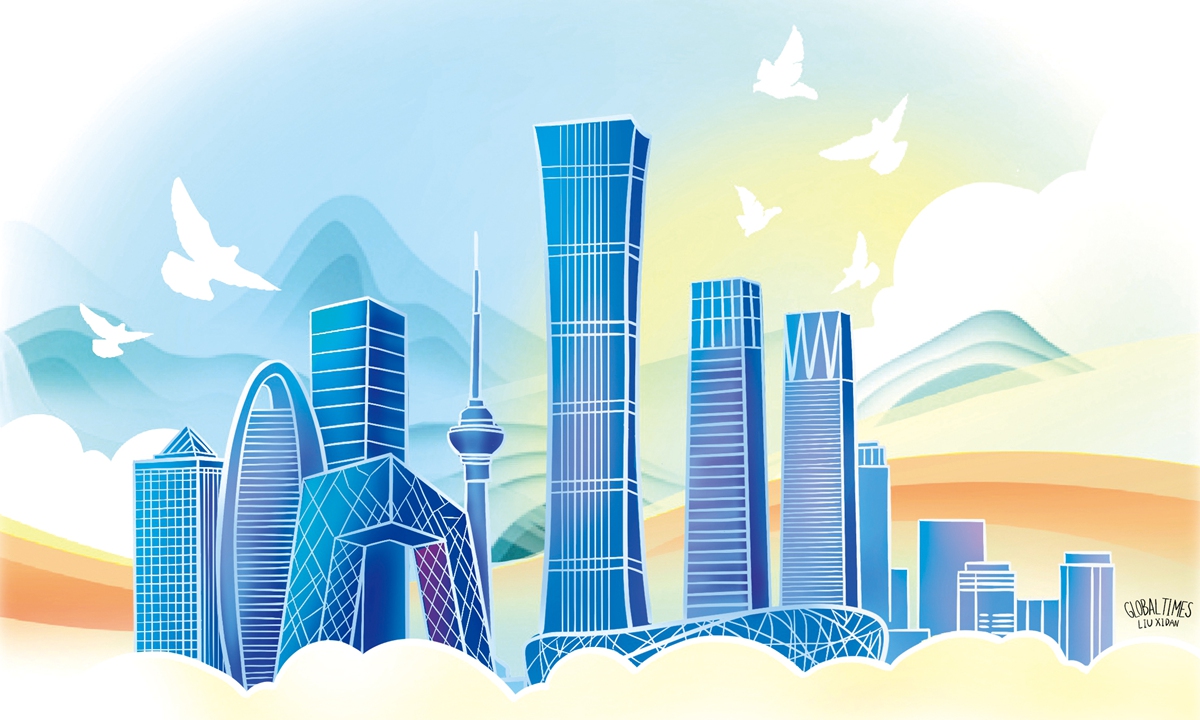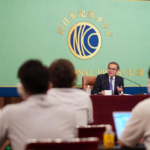I’ve finally got back to Beijing after a four-year break caused by the COVID-19 pandemic. Four-year is not a lot of time in the long history of the city, but some recent changes are hard to miss. For the first time I entered China through a new gateway – the breathtaking Beijing Daxing International Airport. Though the capital never aspired to become a city of super-tall buildings, the Central Business District has nevertheless enriched itself with several state-of-the-art skyscrapers. My hotel was located in the vicinity of the famous Birds Nest and I was truly amazed to observe how the whole district around the National Stadium had developed since my last visit there a couple of years ago.
Beijing is as vibrant as ever before. Though many locals, especially older ones, still wear masks, shopping malls and restaurants look full and streets in the center are crowded. I noticed fewer foreigners and fewer smokers in public places than four years ago. The first is apparently an indication that China has not yet completely opened itself to the outside world, the second might mean that after the pandemic many in Beijing have become more health-conscious. The city looks greener, fresher and more colorful, it acquired new parks and boulevards. In sum, I found the capital more human and more user-friendly than before, despite the exceptionally hot weather that I never experienced on my previous trips here.
The 11th World Peace Forum, which I attended in the first three days of July in Beijing, together with hundreds of academics, businessmen, diplomats and journalists from all over the globe, presents a unique opportunity to measure the ongoing change of the moods within the Chinese and the broader international expert and political communities.
My overall impression of the forum is somewhat obvious: in China and in the world at large they are much more concerned about international developments today than they were four or five years ago. The reasons for growing concerns are manyfold: the Russian-Ukrainian conflict and instabilities in the Middle East, challenges of proliferation and the global food security, the unclear destiny of Afghanistan and a likely next wave of international terrorism, rising uncertainties about the climate change and world finances. All these matters were actively debated. However, the key factor of concern looming above all other problems was the future of US-China relations.
It seems to me that four years ago participants to the World Peace Forum were more relaxed about this critical dimension of global politics. Of course, back in 2019 the US foreign policy was managed by flamboyant, erratic and unpredictable Donald Trump, who could hardly be considered a great fan of China or of a multilateral world order. However, in 2019 there were hopes that many of the complications associated with Trump would fade away together with the latter and that a more professional and more forward-looking leader in the White House would seek a mutually acceptable strategic arrangement between Washington and Beijing.
Alas, today one has to conclude that the problem is not about personalities or communications. It is about the American political class at large that is so far not ready to accept China as a player in international relations equal to the US. There was a broad consensus at the Forum that no matter who gets to power in US next November – Joe Biden, Donald Trump or Ron DeSantis – the US-China relations will stay adversarial rather than cooperative.
The central question discussed at the Forum was about the likely specific format of this adversarial relationship. For instance, it is clear that some degree of “strategic decoupling” in high technologies is unavoidable; it is next to impossible to imagine a large-scale cooperation between the two powers in AI, quantum computing or in space exploration coming anytime soon. It is clear that more of US companies will relocate from China to other jurisdictions in Asia or elsewhere. However, should this decoupling also include by definition an all-out trade war between the two nations? Should it imply a total ban on educational exchanges? After all, the US consumers still badly need all the “made in China” stuff, US Universities are eager to have more Chinese students, and the Chinese diaspora in the US remains numerous, economically successful and politically influential.
Likewise, most at the forum agreed that the geopolitical confrontation between the two great powers would intensify – at least, for the mid-term future. Washington and Beijing are likely to enter a new cycle of intense arms race, to vigorously compete with each other in a variety of regions – from Southeast Asia to Middle East, from North Africa to Latin America. The odds are that the political dialogue will be very difficult and saturated with many disappointments and frustrations for both sides. Still, is there a way to reduce risks and to cut down the costs of this confrontation? Can one put in place badly needed guardrails – such as some forms of bilateral or multilateral arms control, new confidence building measures or more military-to-military contacts? Clear enough, these issues are too important for the whole world to discuss them only in the closed context of the bilateral US-China relations.
Another problem that attracted a lot of attention at the forum was the future role of the EU in the international system. Modalities of the EU role in the world are of paramount importance to many nations, China including. Most participants were ready to admit the emerging new Western cohesion and the enhanced US leadership in the Western world. Nonetheless, how resilient is this cohesion? Is it short-term or long-term? Is it mostly about the Ukrainian crisis, or it is also about the future world order? Should we forget about the EU “strategic autonomy” from the US for many years to come or should we wait for a couple of months to see the quest for this autonomy coming back with more power and more self-confidence?
It would be unrealistic to expect the World Peace Forum to find unambiguous and convincing answers to these and many other questions debated there. But I was impressed with surprisingly optimistic views expressed during most of plenary sessions and thematic panels. The motto of the 11th Forum was: “Stabilizing an Unstable World through Consensus and Cooperation.” It is so easy to predict gloom and doom these days. However, participants to the forum did not confine themselves to lamenting about the blowing winds of history, but they actively debated designs and technical parameters of the windmills to be built by the international community. As Chinese Vice President Han Zheng put it in his keynote speech, China is ready to work with other countries to safeguard world peace and security, seek global development and prosperity, advocate exchanges and mutual learning among civilizations, and share the fruits of human development, security, and civilization.
One of the unofficial symbols of the Chinese capital is chrysanthemum – a flower that is associated with resilience, vitality and unyielding spirit. At the 11th World Peace Forum, all these qualities were displayed in plenty. I leave Beijing in a more upbeat mood than I had arriving in the Middle Kingdom capital a week ago.
The author is the Academic Director of the Russian International Affairs Council. opinion@globaltimes.com.cn













